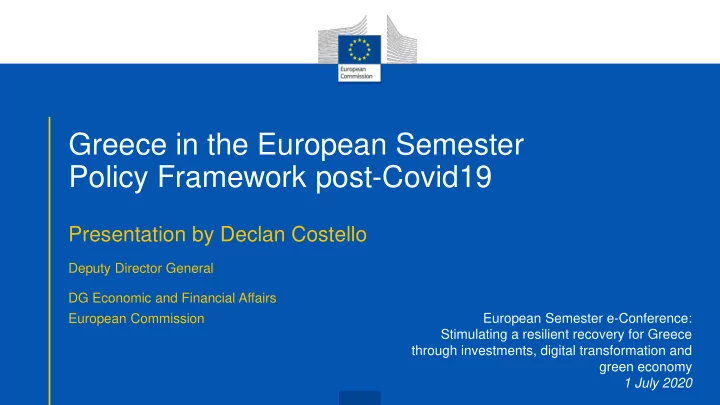

Greece in the European Semester Policy Framework post-Covid19 Presentation by Declan Costello Deputy Director General DG Economic and Financial Affairs European Semester e-Conference: European Commission Stimulating a resilient recovery for Greece through investments, digital transformation and green economy 1 July 2020
A new paradigm to address interrelated challenges 2
Adjusting the Semester to the COVID-19 crisis • Activated the General Escape Clause of Stability and Growth Pact • Five broad priorities for all Member States to support the crisis response : o Investment in public health and the resilience of the health sector o Preserving employment, tackling social impacts and developing skills o Supporting businesses , with a focus on SMEs o Ensuring liquidity provision and stability in the financial sector o Preserving the Single Market and ensuring the flow of critical goods • Forward looking guidance (with 2019 CSRs remaining valid) o green & digital transition o promoting employment and social fairness o ensuring everybody pays their share (Aggressive Tax Planning/Anti Money Laundering) 3 • A Recovery and Resilience Fund managed via the European Semester
Country Specific Recommendations for Greece CSRs published on 20 May → expected to be adopted by the Council in July CSR1 Taking all necessary measures to effectively address the pandemic, sustain the economy and support the ensuing recovery, in line with the general escape clause CSR2 Supporting employment and businesses through the crisis and the recovery CSR3 Promote investments, in particular for the green and digital transitions CSR4 Completing reforms in line with the post-programme commitments
Legacy issue: high share of NPLs and high public debt Non performing loans Debt by sector 40 % of GDP 450 Non-financial Corporations 400 35 Households 350 % of total loans and advances Others - not allocated 30 300 250 25 200 20 150 100 15 50 10 0 2006 2008 2010 2012 2014 2016 2018 5 General government Households; NPISH Non-financial corporations Financial corporations 0 EA public debt EA debt EL CY PT IT BG PL HR LV RO HU SI IE ES MT SK FR AT BE LT DK NL EE CZ FI DE UK SE LU EA EU 5
Persistent current account deficit and weak export performance Current account Export performance 15 140 10 120 5 % of GDP 100 0 80 -5 % of GDP 60 -10 40 -15 20 -20 0 08Q1 09Q1 10Q1 11Q1 12Q1 13Q1 14Q1 15Q1 16Q1 17Q1 18Q1 19Q1 20Q1 -25 02 03 04 05 06 07 08 09 10 11 12 13 14 15 16 17 1819* CY DE ES FR IE IT PT SI EL Trade balance - goods Trade balance - services For each quarter, figure refers to the sum Capital account Income balance of 4 quarters previous to each data point 6 Trade balance Current account balance
A productivity and investment gap 30 % of GDP 120 Labour productivity, whole economy, 25 index Q1 2005 =100 115 20 Investment 110 Gap 18 bn 15 105 10 100 5 95 0 2004 2006 2008 2010 2012 2014 2016 2018 90 05Q4 06Q4 07Q4 08Q4 09Q4 10Q4 11Q4 12Q4 13Q4 14Q4 15Q4 16Q4 17Q4 18Q4 19Q3 EL Corporate investment EL households; NPISH investment EL public investment EA public investment EA total investment EL IT FR PT EA19 7
Greece and the green and digital transition Green transition Digital transition • Environment: Municipal Solid Waste (MSW) • Latest overall Digital Economy and Society Index (DESI) → Greece ranked second last in management relies mainly on landfill disposal (80%) and 15% of collected MSW are recycled the EU vs. EU average of 45% and 37% • Connectivity infrastructure and level of • Energy: per capita greenhouse gas emissions digital skills lag those of Greece’s EU peers (GHG) are 3% higher than the EU average - • Degree of digitisation of businesses is far due to the fossil fuels dependency of the below the EU average (e.g. use of cloud energy sector services by only 7% of firms versus 18% in the • Transport: Greek fleet for medium- and EU) heavy-duty vehicles among oldest (18.7 years • Digital public services indicators have in Greece vs. EU-average of 11.7) started to close the gap with EU peers but remain among the weakest (e.g. 39% uses e- government services vs. 67% EU average) 8
Thank you 9
Recommend
More recommend